Anonymous Survival Guide for Citizens in a Revolution (PDF)
File information
Title: Anonymous_-_ Survival_Guide_for_Citizens_in_a_Revolution
Author: Anonymous
This PDF 1.5 document has been generated by Anonymous, and has been sent on pdf-archive.com on 26/10/2011 at 17:46, from IP address 107.4.x.x.
The current document download page has been viewed 92431 times.
File size: 923.18 KB (15 pages).
Privacy: public file

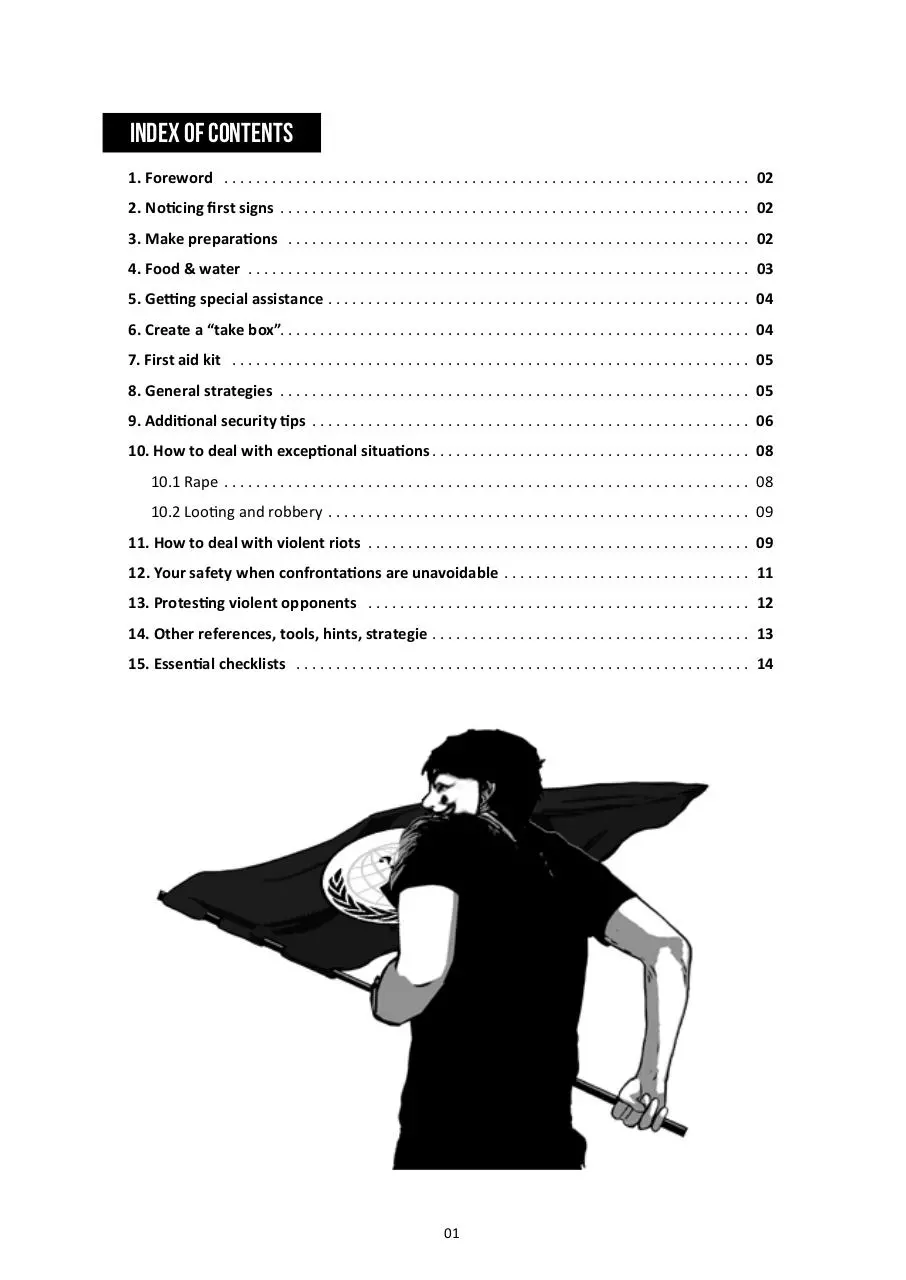
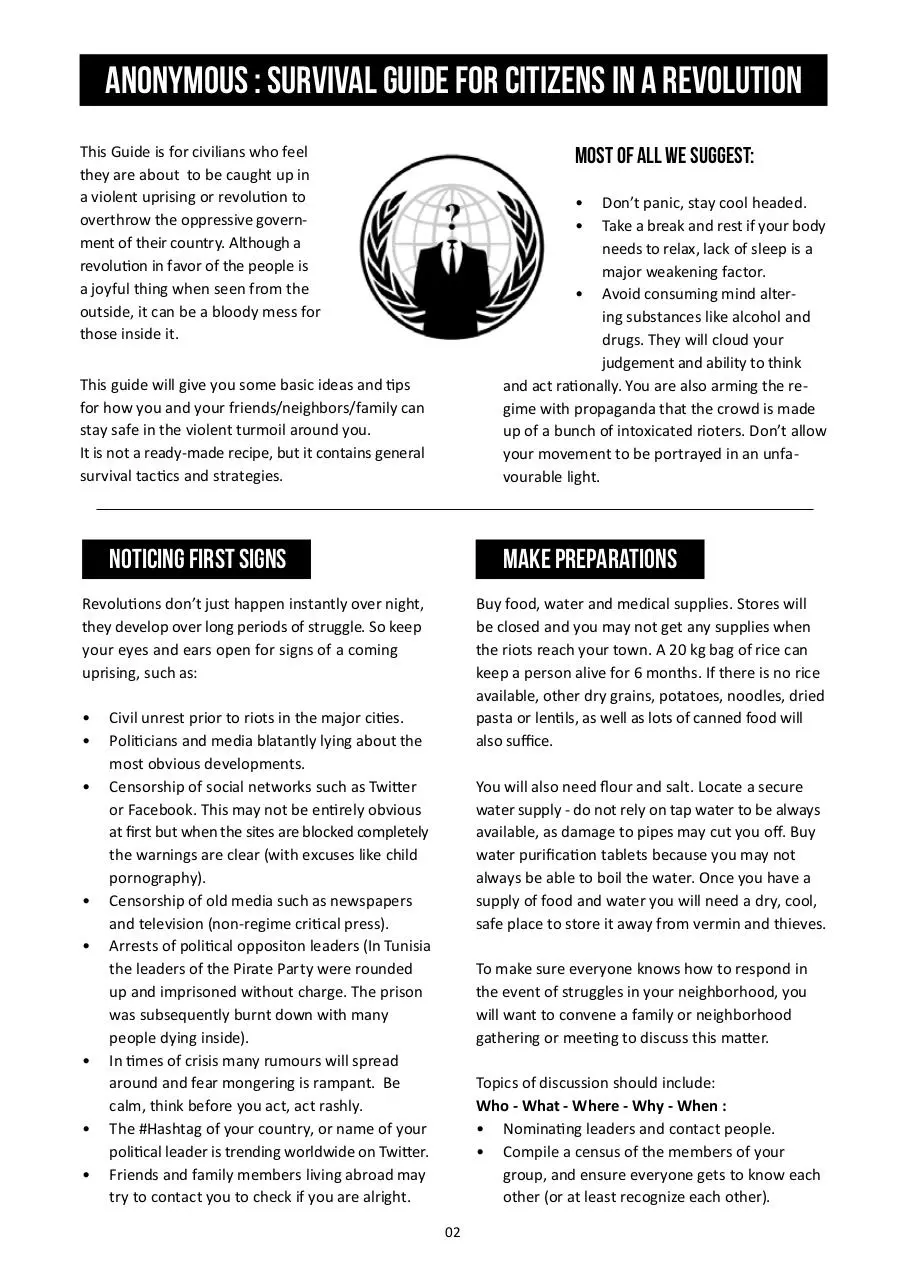
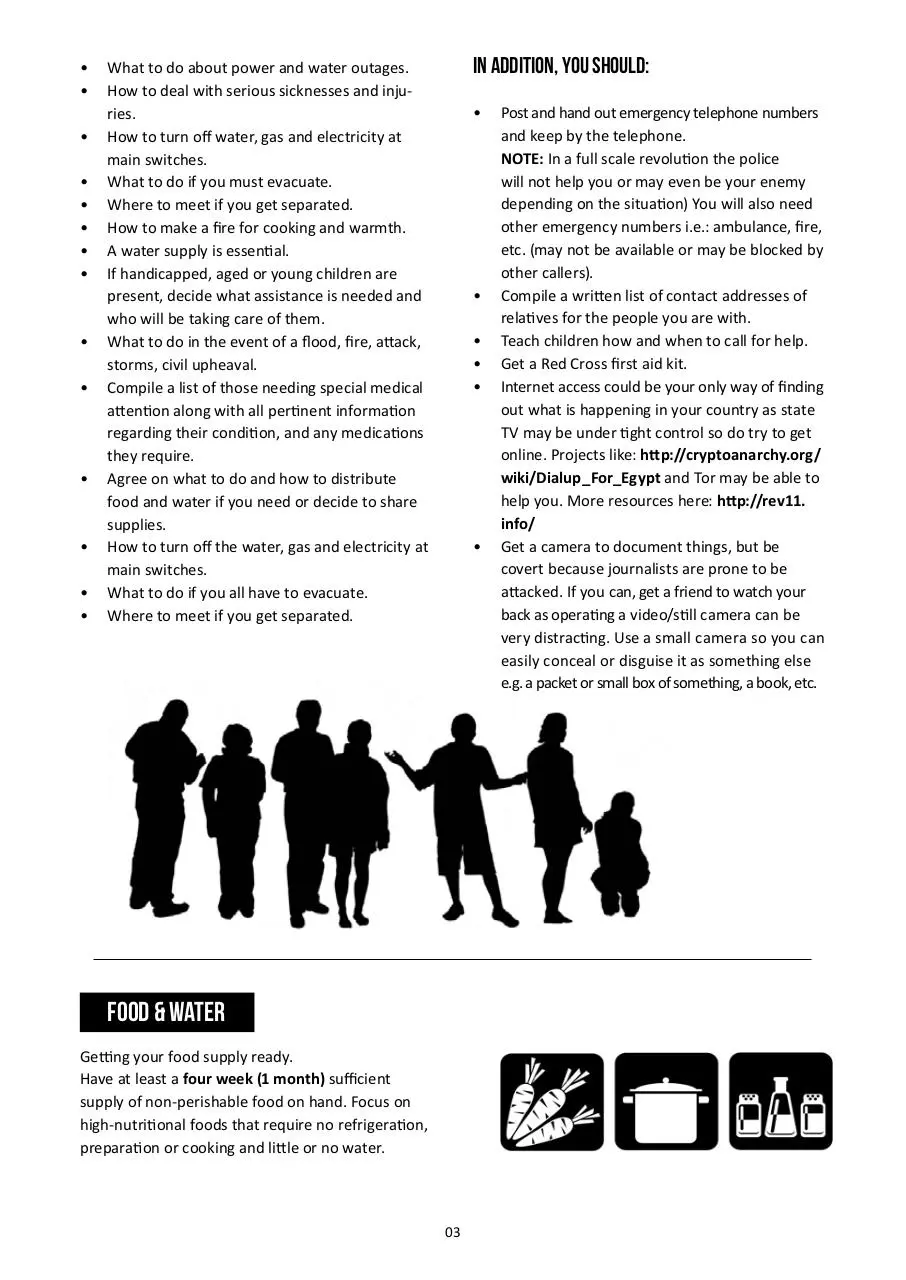
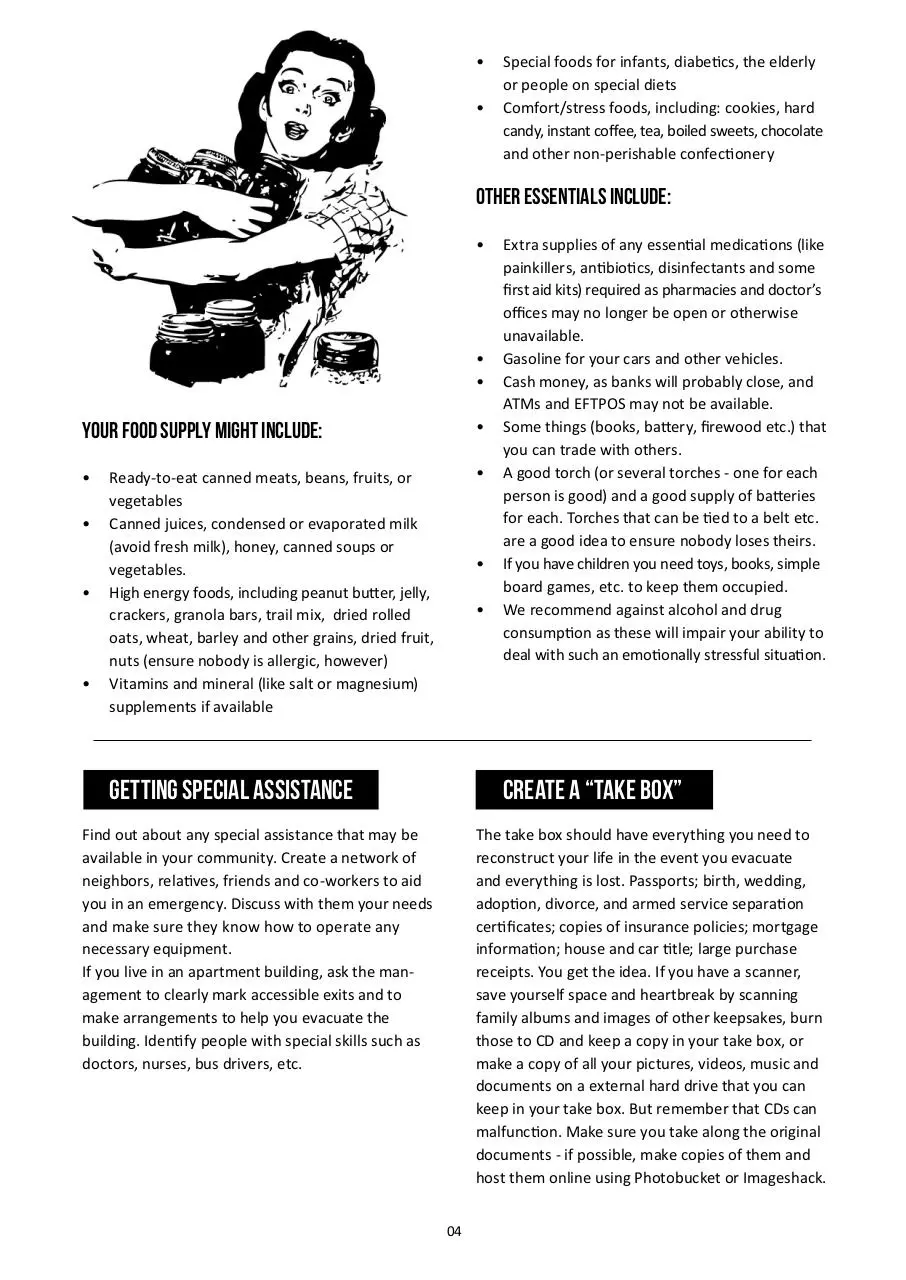
File preview
Anonymous
Survival Guide for Citizens in a Revolution
Version 1.0
This is a snapshot of what Anonymous thinks will be useful for your survival in case of a violent
revolution in your country. As most of Anonymous works, it will be constantly changed, reused,
improved etc. So watch for newer releases.
The guide is far fom beeing complete and is no panacea, so DO NOT SWITCH OFF YOUR BRAIN.
index of contents
ts ts
1. Foreword . . . . . . . . . . . . . . . . . . . . . . . . . . . . . . . . . . . . . . . . . . . . . . . . . . . . . . . . . . . . . . . . . . 02
2. Noticing first signs . . . . . . . . . . . . . . . . . . . . . . . . . . . . . . . . . . . . . . . . . . . . . . . . . . . . . . . . . . . 02
3. Make preparations . . . . . . . . . . . . . . . . . . . . . . . . . . . . . . . . . . . . . . . . . . . . . . . . . . . . . . . . . . 02
4. Food & water . . . . . . . . . . . . . . . . . . . . . . . . . . . . . . . . . . . . . . . . . . . . . . . . . . . . . . . . . . . . . . . 03
5. Getting special assistance . . . . . . . . . . . . . . . . . . . . . . . . . . . . . . . . . . . . . . . . . . . . . . . . . . . . . 04
6. Create a “take box”. . . . . . . . . . . . . . . . . . . . . . . . . . . . . . . . . . . . . . . . . . . . . . . . . . . . . . . . . . . 04
7. First aid kit . . . . . . . . . . . . . . . . . . . . . . . . . . . . . . . . . . . . . . . . . . . . . . . . . . . . . . . . . . . . . . . . . 05
8. General strategies . . . . . . . . . . . . . . . . . . . . . . . . . . . . . . . . . . . . . . . . . . . . . . . . . . . . . . . . . . . 05
9. Additional security tips . . . . . . . . . . . . . . . . . . . . . . . . . . . . . . . . . . . . . . . . . . . . . . . . . . . . . . . 06
10. How to deal with exceptional situations . . . . . . . . . . . . . . . . . . . . . . . . . . . . . . . . . . . . . . . . 08
10.1 Rape . . . . . . . . . . . . . . . . . . . . . . . . . . . . . . . . . . . . . . . . . . . . . . . . . . . . . . . . . . . . . . . . . . 08
10.2 Looting and robbery . . . . . . . . . . . . . . . . . . . . . . . . . . . . . . . . . . . . . . . . . . . . . . . . . . . . . 09
11. How to deal with violent riots . . . . . . . . . . . . . . . . . . . . . . . . . . . . . . . . . . . . . . . . . . . . . . . . 09
12. Your safety when confrontations are unavoidable . . . . . . . . . . . . . . . . . . . . . . . . . . . . . . . 11
13. Protesting violent opponents . . . . . . . . . . . . . . . . . . . . . . . . . . . . . . . . . . . . . . . . . . . . . . . . 12
14. Other references, tools, hints, strategie . . . . . . . . . . . . . . . . . . . . . . . . . . . . . . . . . . . . . . . . 13
15. Essential checklists . . . . . . . . . . . . . . . . . . . . . . . . . . . . . . . . . . . . . . . . . . . . . . . . . . . . . . . . . 14
01
Anonymous : Survival Guide for Citizens in a Revolution
This Guide is for civilians who feel
they are about to be caught up in
a violent uprising or revolution to
overthrow the oppressive government of their country. Although a
revolution in favor of the people is
a joyful thing when seen from the
outside, it can be a bloody mess for
those inside it.
Most of all we suggest:
• Don’t panic, stay cool headed.
• Take a break and rest if your body
needs to relax, lack of sleep is a
major weakening factor.
• Avoid consuming mind altering substances like alcohol and
drugs. They will cloud your
judgement and ability to think
and act rationally. You are also arming the regime with propaganda that the crowd is made
up of a bunch of intoxicated rioters. Don’t allow
your movement to be portrayed in an unfavourable light.
This guide will give you some basic ideas and tips
for how you and your friends/neighbors/family can
stay safe in the violent turmoil around you.
It is not a ready-made recipe, but it contains general
survival tactics and strategies.
noticing first signs
Make preparations
Revolutions don’t just happen instantly over night,
they develop over long periods of struggle. So keep
your eyes and ears open for signs of a coming
uprising, such as:
Buy food, water and medical supplies. Stores will
be closed and you may not get any supplies when
the riots reach your town. A 20 kg bag of rice can
keep a person alive for 6 months. If there is no rice
available, other dry grains, potatoes, noodles, dried
pasta or lentils, as well as lots of canned food will
also suffice.
• Civil unrest prior to riots in the major cities.
• Politicians and media blatantly lying about the
most obvious developments.
• Censorship of social networks such as Twitter
or Facebook. This may not be entirely obvious
at first but when the sites are blocked completely
the warnings are clear (with excuses like child
pornography).
• Censorship of old media such as newspapers
and television (non-regime critical press).
• Arrests of political oppositon leaders (In Tunisia
the leaders of the Pirate Party were rounded
up and imprisoned without charge. The prison
was subsequently burnt down with many
people dying inside).
• In times of crisis many rumours will spread
around and fear mongering is rampant. Be
calm, think before you act, act rashly.
• The #Hashtag of your country, or name of your
political leader is trending worldwide on Twitter.
• Friends and family members living abroad may
try to contact you to check if you are alright.
You will also need flour and salt. Locate a secure
water supply - do not rely on tap water to be always
available, as damage to pipes may cut you off. Buy
water purification tablets because you may not
always be able to boil the water. Once you have a
supply of food and water you will need a dry, cool,
safe place to store it away from vermin and thieves.
To make sure everyone knows how to respond in
the event of struggles in your neighborhood, you
will want to convene a family or neighborhood
gathering or meeting to discuss this matter.
Topics of discussion should include:
Who - What - Where - Why - When :
• Nominating leaders and contact people.
• Compile a census of the members of your
group, and ensure everyone gets to know each
other (or at least recognize each other).
02
In addition, you should:
• What to do about power and water outages.
• How to deal with serious sicknesses and injuries.
• How to turn off water, gas and electricity at
main switches.
• What to do if you must evacuate.
• Where to meet if you get separated.
• How to make a fire for cooking and warmth.
• A water supply is essential.
• If handicapped, aged or young children are
present, decide what assistance is needed and
who will be taking care of them.
• What to do in the event of a flood, fire, attack,
storms, civil upheaval.
• Compile a list of those needing special medical
attention along with all pertinent information
regarding their condition, and any medications
they require.
• Agree on what to do and how to distribute
food and water if you need or decide to share
supplies.
• How to turn off the water, gas and electricity at
main switches.
• What to do if you all have to evacuate.
• Where to meet if you get separated.
• Post and hand out emergency telephone numbers
and keep by the telephone.
NOTE: In a full scale revolution the police
will not help you or may even be your enemy
depending on the situation) You will also need
other emergency numbers i.e.: ambulance, fire,
etc. (may not be available or may be blocked by
other callers).
• Compile a written list of contact addresses of
relatives for the people you are with.
• Teach children how and when to call for help.
• Get a Red Cross first aid kit.
• Internet access could be your only way of finding
out what is happening in your country as state
TV may be under tight control so do try to get
online. Projects like: http://cryptoanarchy.org/
wiki/Dialup_For_Egypt and Tor may be able to
help you. More resources here: http://rev11.
info/
• Get a camera to document things, but be
covert because journalists are prone to be
attacked. If you can, get a friend to watch your
back as operating a video/still camera can be
very distracting. Use a small camera so you can
easily conceal or disguise it as something else
e.g. a packet or small box of something, a book, etc.
Food & water
Getting your food supply ready.
Have at least a four week (1 month) sufficient
supply of non-perishable food on hand. Focus on
high-nutritional foods that require no refrigeration,
preparation or cooking and little or no water.
03
• Special foods for infants, diabetics, the elderly
or people on special diets
• Comfort/stress foods, including: cookies, hard
candy, instant coffee, tea, boiled sweets, chocolate
and other non-perishable confectionery
Other essentials include:
• Extra supplies of any essential medications (like
painkillers, antibiotics, disinfectants and some
first aid kits) required as pharmacies and doctor’s
offices may no longer be open or otherwise
unavailable.
• Gasoline for your cars and other vehicles.
• Cash money, as banks will probably close, and
ATMs and EFTPOS may not be available.
• Some things (books, battery, firewood etc.) that
you can trade with others.
• A good torch (or several torches - one for each
person is good) and a good supply of batteries
for each. Torches that can be tied to a belt etc.
are a good idea to ensure nobody loses theirs.
• If you have children you need toys, books, simple
board games, etc. to keep them occupied.
• We recommend against alcohol and drug
consumption as these will impair your ability to
deal with such an emotionally stressful situation.
Your food supply might include:
• Ready-to-eat canned meats, beans, fruits, or
vegetables
• Canned juices, condensed or evaporated milk
(avoid fresh milk), honey, canned soups or
vegetables.
• High energy foods, including peanut butter, jelly,
crackers, granola bars, trail mix, dried rolled
oats, wheat, barley and other grains, dried fruit,
nuts (ensure nobody is allergic, however)
• Vitamins and mineral (like salt or magnesium)
supplements if available
getting special assistance
create a “take box”
Find out about any special assistance that may be
available in your community. Create a network of
neighbors, relatives, friends and co-workers to aid
you in an emergency. Discuss with them your needs
and make sure they know how to operate any
necessary equipment.
If you live in an apartment building, ask the management to clearly mark accessible exits and to
make arrangements to help you evacuate the
building. Identify people with special skills such as
doctors, nurses, bus drivers, etc.
The take box should have everything you need to
reconstruct your life in the event you evacuate
and everything is lost. Passports; birth, wedding,
adoption, divorce, and armed service separation
certificates; copies of insurance policies; mortgage
information; house and car title; large purchase
receipts. You get the idea. If you have a scanner,
save yourself space and heartbreak by scanning
family albums and images of other keepsakes, burn
those to CD and keep a copy in your take box, or
make a copy of all your pictures, videos, music and
documents on a external hard drive that you can
keep in your take box. But remember that CDs can
malfunction. Make sure you take along the original
documents - if possible, make copies of them and
host them online using Photobucket or Imageshack.
04
First aid kit
Learn how to use it, and make sure it is well
stocked. Get a first aid manual and a kit that will
allow you to stop bleeding, disinfect and treat cuts
and wounds large and small. In Vietnam soldiers
often used tampons to plug bullet hole wounds
for example. If there is any on hand, most stronger
spirits (vodka, etc.) can be used to clean wounds,
but CLEAN running water will do if there is nothing
else. Scarves and bandanas can be used as bandages,
as can bedsheets.
In general, use common sense and learn what to
do for various injuries. Take stock of other common
items which may have novel uses.
general strategies
• Contact and join forces with groups in other
neighborhoods. Each neighborhood should act
as an independent squad, but should always be
ready to assist others in the area.
• Always be on guard with as many people as
possible. Ask trustworthy members of the
military to help you reinforce your groups by
adding soldiers to each of them or staying
in contact with one of your group members
designated for that purpose.
• Collaborative mapping: Use paper (to draw
a map) or a city map or street directory, and
mark dangerous/safe places on it as well as
places where assistance is available, water taps,
etc. To share this information use Google Earth
(if you are able to connect to the Internet).
Do not use this for sensitive information that
should be detained from government forces,
as anyone can view the map.
• If there is mobile phone service, designate one
person as a contact for anyone who is lost or
who has become separated from the group.
Agree on places to meet up if the group is
separated that are safe, but visible (e.g. a parking
lot or an easily-recognised friend’s house).
• DO NOT USE MOBILE PHONES TO PLAN
OPERATIONS IF THE GOVERNMENT AND
SECURITY FORCES ARE YOUR ENEMIES.
They will be tracked and monitored.
• Band together into small squads of known
friends. That way you recognize infiltrators, like
fake civilians, as was seen at the G20 summit in
Canada. (Watch for pieces of police uniforms
like police shoes usually black boots, they tend
to stay in little violent groups.)
• Wear white/green head bands so military
personnel can recognize you - Be visible.
• Do not let children go outdoors unless you are
certain that it is safe and do not let them out of
your sight. A bandana as a head band is a handy
article because it is multi-purpose.
• Stay with any elderly or disabled people or children
who are out in the street, as they may be lost
or disoriented and may need assistance.
05
additional security tips
• Stay away from gunfire and sounds of violence
rather than seeking to investigate. If you must
investigate, do it discreetly; ask around for
information rather than trying to acquire it
yourself.
• Designated non verbal signals and codes need
to be known to all members of the group
- chalked signs on walls can be helpful, or
whistles, hand and arm signals, etc
• Help those you can but do not endanger yourself
or your group by doing so.
• Find and collect fire extinguishers and fire blankets. Make sure everyone knows where they
are kept and how to use them. Do not steal fire
fighting equipment if it is in a populated location.
• Build a barricade and maintain watch at all
points of entrance to the area in which you are
staying. Form compounds with individuals you
trust and create a barrier of flat visible ground.
• Make a barricade of cars on neighbouring
streets. Always have a vehicle ready in case
someone needs medical attention. Refrigerators, washing machines, and other heavy
equipment are also useful components of such
barriers.
• Do not trust barricades as safe protection
against gun fire. Fill bags with sand or dig
trenches for some additional protection but do
not trust your life to such things.
• If you must fight, it is best to do so inside buildings, where guns have less advantage - they
can’t just move far away and keep shooting.
• DO NOT TRY TO FIGHT MEN WHO HAVE GUNS
OR ANY WEAPONS. REMAIN CALM AND
REFRAIN FROM SUDDEN MOVEMENTS IN
THE PRESENCE OF ANY ARMED ADVERSARIES
WHO ARE NOT A DEFINITE THREAT.
• Have a plan. A meeting place and some sort
of escape route should be prepared in case of
emergency. Have local maps and a compass on
hand. Satellite dishes are faced to the Equator.
• Try and remain calm and focused. Remember
to eat, drink and sleep when you need to. Your
body will give you hints, do not fight against
these.
• Learn to recognise signs of low blood sugar,
exhaustion and dehydration in yourself and
others, as well as signs of heatstroke. Also
learn to recognise symptoms of asthma attacks
and other similar issues, and what to do about
them.
• Assist the injured in moving wherever possible.
Even a short walk can turn a minor sprain into
a major one. Learn how to improvise stretchers
or move people safely if
they are too injured
to walk with
assistance.
• Avoid making journeys by car unless you are
a VERY confident and skilled driver and know
your vehicle well and are able to maintain
it. The last thing you need is a flat tire in the
middle of a riot.
• If you must travel on foot, travel light - carry
only what you absolutely require for the journey.
Carrying large backpacks or bags can make you
stand out, and carrying extra weight may make
it more difficult to move quickly if you need to
get away.
• If you are in or traveling through an area you’re
not familiar with, make good use of a road map
or street directory, or ask locals (carefully) for
directions.
06
• Your area is more likely to be avoided by hostile
groups if they perceive the possibility of
organized and substantial resistance.
• When in doubt, retreat to a safer location (the
high ground where possible). Ensure that those
you trust all agree on a fall back location in
case of a chaotic situation.
• Don’t be an hero. Dying in the frantic attempt
to save two, kills three. Try to stay level-headed
and analyze situations before you act.
• Make noise to alert other neighbors to threats.
Ensure that all are aware of what such noises
indicate. People not used to the sound may
mistake fireworks for gunfire. Make a distinctive
sound: use a whistle, vuvuzella, kazoo or
cowbell, you can even learn to whistle yourself.
Any loud instrument
can also be a good
solution.
•
•
•
•
•
•
•
•
• Protection begins with protecting yourself.
• Ensure that you have adequate head protection
(even a saucepan is something, but a hardhat
or bicycle/motorcycle helmet is best) but the
minimum is a baseball cap or other hat.
• Safety goggles for the eyes if available, or
sunglasses if it’s all you can find.
• A kerchief for the nose and mouth.
• Good solid shoes that are comfortable for
walking long distances. Steelcaps/Steel Toe/
Steel Shank boots, will protect your feet
from broken glass, nails, and even possibly
an electrocution (because of the rubber
sole), they are however very dangerous in
cold weather as steel toes will draw in the
cold air, not insulate as well, and possibly
lead to frostbite and/or lost toes. If borrowing shoes, ensure that they are the right size
as blisters can get infected very quickly and
will hinder you. If you are prone to blisters,
•
apply paper tape (tape used to hold dressings in place; can be found at most pharmacies) or band-aids to areas where you
normally get blisters before you leave.
• Socks, make sure you have a couple of pairs
of socks. If your feet get wet they become
very prone to blisters and sores. To prevent
this from happening, change your socks if
your feet are wet.
Stay in a place where you can see the surrounding
area and be seen by your squad.
Never separate from the group alone - use the
buddy system.
For enhanced protection, groups within local
communities should stay together.
Inform others what you are doing and share
information with them - organize and maintain
contact with other neighborhoods.
Write down license plate numbers and other
vehicle info (color, make, model, etc.) in case
of suspicious activity. The number of occupants,
general ages, genders, etc., are useful as well.
Make photographs/videos of hostile people
with your mobile phone discreetly.
Stay cool and avoid all arguments and fights,
you are on a peaceful defensive course of action,
not an offensive one.
Organise a shift system to keep watch around
the compound.
Be visible: wear a white/green head band so
military can distinguish you.
Never wear military camouflage - you don’t
want to be mistaken
as a mercenary.
• Make sure your
mobile phone’s
battery is fully
charged and operating.
Keep some coins on-hand
or try to acquire a phone card (if these are
available in your country), and note locations
of public phones and their availability. If you
can, get a satelite cell phone.
07
only when safety has been regained. If it is safe,
contact other witnesses to verify information.
• The source from which you obtained this
document will have further documents for you
soon; these will provide technical instructions on
advancing the revolution once initial security is
established. Other forms of aid will be sent in
the coming weeks. In the meantime, build your
neighborhood alliances and communications
networks. Please share with as many other
people as you can. Maintain a network for
this process but do so in a way that does not
endanger anyone in the case of infiltration by
government forces. Don’t write down names,
or even Internet handles, email adresses, etc. anything that can be used to identify a person.
• Post look out guards when others are sleeping.
Work in short shifts (3-4h), but ensure everyone
has adequate sleep - a sleepy guard isn’t watchful, and sleepy people make mistakes easily.
Older people and children will need much more
sleep - remember to account for this.
• Trade contact numbers with other groups like
yours so that you may support each other with
information and protection. Remember: information is the most fundamentally important
protection!
• Always have emergency phone numbers on
hand. Everyone must know what to do in case
of problems and where to go (nearest hospital,
home of a relative, etc).
• Learn how to use a dial-up modem to get to the
internet and how to use international dial-up
services. http://cryptoanarchy.org/wiki/Dialup_
For_Egypt
• If you see atrocities try to record and report
them to the international media (but only after
safely informing neighbors for their protection).
Date, time, place, who the parties involved
were, what it was about and what happened.
If you have web access, you may leave reports
on any Anonymous-run message board. Have
someone in your neighborhood who is internet
savvy be in charge of further distribution, but
how to deal with exceptional situations
rape
• NEVER provoke! What might be okay in a stable
society will get you in deep trouble in times
when there is no backed law enforcement.
• Wear a wedding ring or wedding band,
even if not married.
The best protection against rape is not to get in
a situation where it could happen
• Never go out alone (day or night)
• Try to appear undesirable and unattractive, but do not look helpless, or unable to
escape.
• Wear clothes that cover most of your skin,
clothing that is hard to remove for attackers, but do not hinder you while running
fast, or climbing a fence.
• Wear: jeans, belt, turtleneck etc.
• Do not wear: Skirts
• Wear decent shoes that you can run in, like
sneakers or light boots
• Never leave public places, and don’t let
people isolate you
• Don’t trust new friends
If you cannot avoid it
• Prevent beeing transported to a secondary
site, use passive resistance, try to stay put
• Yell “FIRE”, not “help”, as more people will
react to it.
• Use your head and assess the situation,
don’t waste your energy.
• If you’re pinned wait for an opportunity to
break out
• If you fight aim for the eyes, throat or genitals, dislocate/break fingers.
08
Download Anonymous - Survival Guide for Citizens in a Revolution
Anonymous - Survival Guide for Citizens in a Revolution.pdf (PDF, 923.18 KB)
Download PDF
Share this file on social networks
Link to this page
Permanent link
Use the permanent link to the download page to share your document on Facebook, Twitter, LinkedIn, or directly with a contact by e-Mail, Messenger, Whatsapp, Line..
Short link
Use the short link to share your document on Twitter or by text message (SMS)
HTML Code
Copy the following HTML code to share your document on a Website or Blog
QR Code to this page
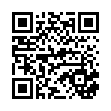
This file has been shared publicly by a user of PDF Archive.
Document ID: 0000034665.